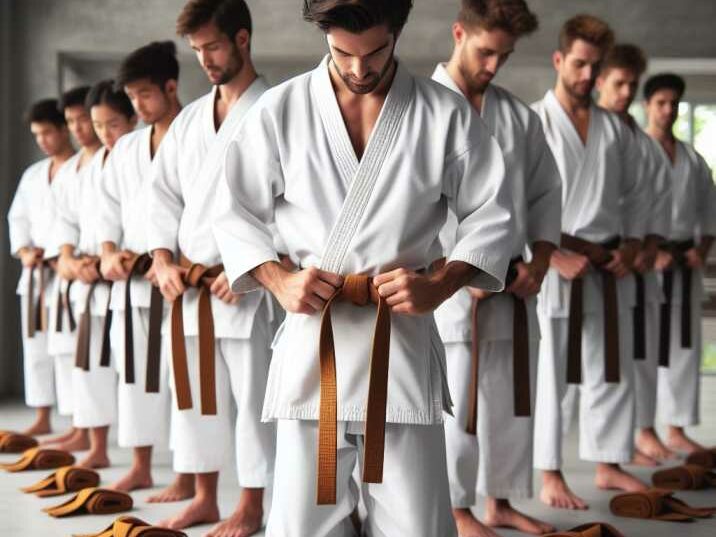Introduction:
Table of Contents
In the world of martial arts, each discipline carries its unique essence, history, and techniques. Karate, a Japanese martial art form, stands out among its peers for its focus on striking techniques, defensive tactics, and philosophical underpinnings. As we embark on this journey, we’ll unravel the distinctive aspects how Karate differs from other martial Arts?

Understanding Karate:
Karate, which means “empty hand” in Japanese, emphasizes strikes, kicks, and blocks as its primary techniques. It originated in the Ryukyu Kingdom, now Okinawa, and has since evolved into various styles. Karatekas, practitioners of Karate, train extensively in kata (forms), kumite (sparring), and kihon (basic techniques) to develop precision, speed, and control.
How Karate differs from Other Martial Arts
Key Differences:
1. Focus on Striking:
Karate distinguishes itself by placing a primary focus on striking techniques over grappling or throwing. Practitioners utilize a variety of striking surfaces including hands, elbows, feet, and knees to execute precise and powerful strikes.
2. Emphasis on Discipline:
Discipline lies at the heart of Karate philosophy. Practitioners are not only trained in physical techniques but also in cultivating mental fortitude, respect, and self-control. These values are deeply ingrained in the practice, shaping not just martial prowess but character as well.
3. Philosophical Foundations:
Many styles of Karate are steeped in Eastern philosophy, emphasizing the harmonious development of mind, body, and spirit. Principles such as humility, perseverance, and integrity are woven into training, fostering personal growth alongside physical skill.
4. Training Methods:
Karate training is characterized by disciplined repetition and focused practice. Practitioners dedicate themselves to mastering fundamental techniques through meticulous repetition, with a relentless pursuit of precision and form. This methodical approach ensures proficiency and effectiveness in combat scenarios.
5. Uniforms and Belt System:
Karate practitioners adhere to a traditional uniform known as a gi, which symbolizes respect for the art and its heritage. Additionally, Karate employs a belt system to denote a practitioner’s progress and proficiency. Advancement through various belt ranks signifies both skill level and commitment to the discipline.
Comparison with Other Martial Arts:
While Karate shares similarities with other martial arts such as Taekwondo, Kung Fu, and Judo, it maintains its distinct identity through its principles, techniques, and cultural heritage. Taekwondo, for example, places greater emphasis on high kicks and agility, while Judo focuses on throws and grappling techniques.

Table of Information How Karate differs from Other Martial Arts:
| Aspect | Karate | Other Martial Arts |
|---|---|---|
| Primary Techniques | Strikes, kicks, blocks | Varies depending on the style |
| Origin | Ryukyu Kingdom, Japan | Various origins worldwide |
| Belt System | Yes | Yes |
| Philosophical Foundations | Emphasized | Varies depending on the style |
| Training Methods | Repetitive practice, emphasis on precision and form | Varies depending on the style |
Conclusion:
In the diverse landscape of martial arts, How Karate differs from other martial Arts, Karate shines as a timeless discipline that embodies tradition, discipline, and self-improvement. Its unique blend of striking techniques, philosophical foundations, and cultural heritage sets it apart as a cherished art form with a global following.
FAQs:
1. What is the origin of Karate? Karate originated in the Ryukyu Kingdom, now Okinawa, Japan, blending indigenous martial arts with Chinese influences.
2. What are the main techniques in Karate? Karate emphasizes strikes, kicks, blocks, and stances as its primary techniques.
3. How does Karate differ from Taekwondo? While both are martial arts, Karate focuses more on hand strikes and blocks, whereas Taekwondo emphasizes kicking techniques.
4. Is Karate suitable for self-defense? Yes, Karate equips practitioners with effective self-defense techniques, teaching them to respond swiftly and decisively in threatening situations.
5. Can anyone practice Karate? Yes, Karate is suitable for people of all ages and fitness levels, promoting physical fitness, mental discipline, and personal growth.


